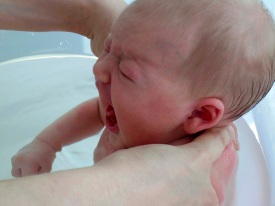Could we Stop Migraine – At the Start of Life?
We know that people start having migraine attacks as very young children. It’s hard to say if there’s an age when migraine starts, because the younger we are the harder it is for us to recognize and express the symptoms.
I may have had migraine as a child – but I’ll probably never be sure how early, because I just didn’t know what was going on. I just knew that I "didn’t feel well". In fact, I didn’t often think it consciously – it just was the way it was.
 |
But a new study raises an interesting question – could colic actually be a sign of migraine in babies?
Parents with Migraine – Babies with Colic
The study simply shows that mothers who have migraine are more likely to have babies with colic. For the uninitiated, colic is diagnosed when a baby shows signs of distress (such as crying or screaming) for an extended period of time (several hours) for no discernible reason. Usually it happens at the same time every day, and lasts for several weeks. [more on colic here]
How much more likely are migraineur Moms to have babies with colic? Twice as likely – pretty significant.
Genetics and Causes
Fine, but what does that have to do with children or babies with migraine? Are the babies showing signs of migraine when they have colic?
Maybe – but let’s not jump to conclusions.
We do know that parents with migraine are much more likely to have children with migraine, because migraine has a genetic factor. It would be interesting to see if these babies grew into migraineurs.
Even if the babies don’t technically have migraine, if we could find the link, we might be able to stop migraine before it starts. What if (for example), the babies had a genetic mutation that adult migrianeurs also had? What if they had a defect that could be corrected early on through minor surgery?
Ease Migraine, Ease Colic
If there is a link, could we ease colic in similar ways that we ease migraine? For example, would a colicky baby do better in an environment with less light and noise? It may be that finding a link could help not only to stop migraine but ease colic in the first place.
Colic: The Dark Side
The dark side of colic is something we don’t want to talk about. Colicky babies are also more likely to be shaken – leading to severe disability and even death. So the question we have to ask is – how can we support parents, who themselves are dealing with disabling symptoms and pain of migraine – when they have a baby with colic? How can we keep a very difficult situation from getting worse?
For now – the key word is…
This study may seem to raise more questions than it answers – and it probably does. So for now, the key word is probably support. How can doctors better support mothers with migraine? How can we all help parents who are going through this difficult time?
If you know someone dealing with an infant with colic – especially when the parent has migraine – could you give them a little extra help today?
Meanwhile, the study will hopefully lead to more research in this area. Wouldn’t it be great if we could recognize and treat the next generation of migrianeurs – before they reach the age of 5?
